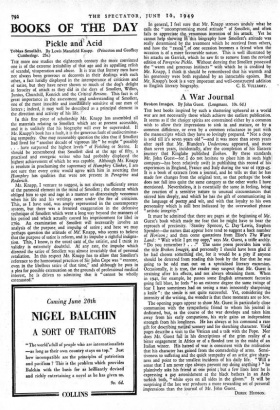BOOKS OF THE DAY
Pickle and Acid
THE more one studies the eighteenth century the more convinced one is of the extreme irritability of that age and its appalling relish of scandal, vituperation and abuse. It is true that literary men have not always been generous or decorous in their dealings with each other, a fact luridly displayed in the intemperance of criticism and of satire, but they have never shown so much of the dog's delight in ferocity of attack as they did in the days of Smollett, Wilkes, Junius, Churchill, Kenrick and the Critical Review. This fact is of great importance in the assessment and understanding of Smollett, one of the most irascible and inordinately sensitive of our men of letters ; indeed, it may well be described as a principal element in the direction and activity of his life.
In this fine piece of scholarship Mr. Knapp has assembled all the materials relating to Smollett which are at present accessible, and it is unlikely that his biography will ever be superseded. If Mr. Knapp's book has a fault, it iS the generous fault of undiscriminat- ing sympathy. One may reasonably question the idea that if Smollett had lived for "another decade of vigorous life" he might "possibly • . . have surpassed the highest levels" of Fielding or Sterne. It should be remembered that Smollett died at the age of fifty, a practised and energetic writer who had probably displayed the highest achievement of which he was capable. Although Mr. Knapp is resolute in proclaiming the supremacy of Hum phry Clinker, I am not sure that every critic would agree with him in asserting that Hum phry has qualities that were not present in Peregrine and Roderick.
Mr. Knapp, I venture to suggest, is not always sufficiently aware of the paranoid element in the mind of Smollett ; the element which obliged him to spit and rage in a manner so distressingly venomous when his life and his writings came under the fire of criticism. This, as I have said, was amply represented in the contemporary system, but there was a frenzied exaggeration in the defensive technique of Smollett which went a long way beyond the manners of his period and which actually caused his imprisonment for libel in 1760. An examination of Smollett will necessarily involve an analysis of the purpose and impulse of satire ; and here we may perhaps question the attitude of /a. Knapp, who seems to believe that the purpose of satire is reform, and its impulse a rightful indigna- tion. This, I know, is the usual cant of.the satirist, and I trunk its validity is extremely doubtful. At any rate, the impulse which directed the satire of Smollett was almost invariably that of personal retaliation. In this respect Mr. Knapp has to allow that Smollett's 'reference to the homosexual practices of Sir John Cope was "extreme, even in the libellous satire of that time," and although he puts in a plea for possible extenuation on the grounds of professional medical interest, he is driven to admitting that it "cannot be wholly extenuated." In general, I feel sure that Mr. Knapp stresses unduly what he calls the "uncompromising, moral attitude" of Smollett, and often fails to appreciate the venomous intention of his attack. Yet he cannot help showing ffi this biography how Smolletes attitude was really determined by the treatment which he received from others, and how the " rascal",. of one occasion becomes a friend when the occasion is of a more favourable nature. This is well illustrated by his attacks on Garrick, which he saw fit to remove from the revised edition of Peregrine Pickle. Without denying that Smollett possessed the "warm and generous instincts" with which he is credited by Mr. Knapp, I think it, should be remembered that his warmth and his generosity were both regulated by an intractable egoism. But Mr. Knapp's book is a very important and well-constructed addition


































 Previous page
Previous page